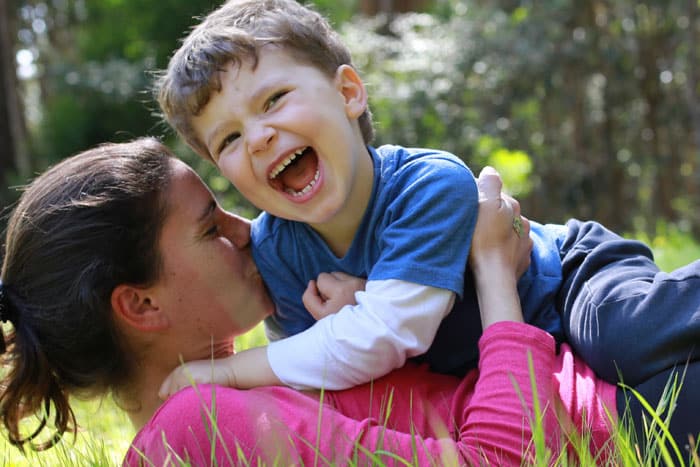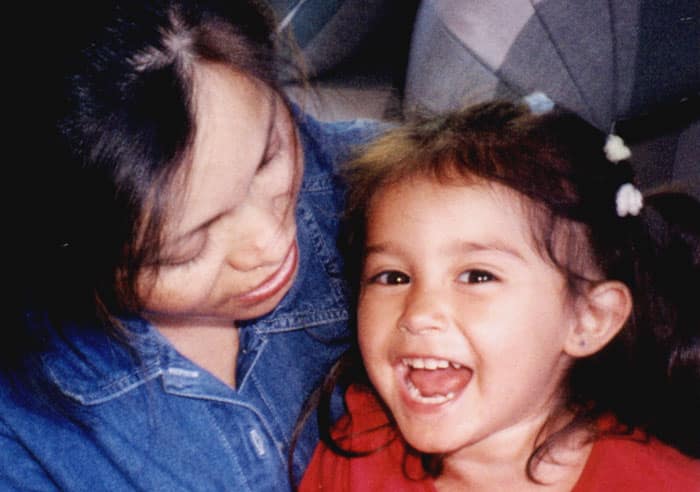Q: I feel badly about this, but sometimes I hesitate to really get down and play with my daughter, because when I have to stop playing and tend to the baby, she gets so upset. How can I keep from hurting her feelings?
—a mother of a baby and a four-year-old
A: It’s healthy and often necessary for parents to say, “OK, now I need to fix dinner, so I need to stop playing with you now.” We have many tasks to juggle, and we often have to stop playing with our children, end their play with each other, or move them toward a new activity before they're ready to make a change. Some children are able to be pretty flexible with these transitions, and other children protest every single change that is directed by their parents. Wherever your child is on this continuum right now, there are a few ideas that may help you navigate transitions.
Children thrive on fun and connection

Our children clearly thrive on the moments when we are focused on them, and when their play is just the way they want it. I like to remind parents that when children say, “I don't want to stop,” it is good! It's great that your child is passionate about playing with you, or having things just the way he wants them. It is healthy for them to never want the fun to stop! They will likely have enough humdrum experiences later in their life. Now is the time for as much sparkle and connection as possible. Having fun makes children eager to learn and make good friends.
Children benefit from information
When you need to change an activity, it's important to talk with your child about it. It's never too early in a child's life to begin letting them know what's next. “In a couple of minutes, I'm going to start your bath, because it's getting close to bedtime” is information that is as helpful to a three-month-old as it is to a five-year-old.
Getting into the habit of offering information to a very young child helps a child feel respected. Information kindly given, together with a little time to help the information sink in, helps prevent some of the balking and power struggles that develop around transitions.
Children flourish with a tone of optimism
A tone that carries friendliness, optimism, and the understanding that there will be good times ahead makes it more likely that a transition will go well. Although no parent can pull this off all the time, having a tone of optimism can help children feel close enough to their parent to cooperate with a necessary transition, even if it wasn't their idea.
Instead of orders, offer warmth
“Lunchtime! Get in here right now, you two,” doesn't make a child want to come anywhere near his parent. “You two are having such a good time! Lunch is on the table, and after you eat, you can go back and play some more,” carries the kind of warmth that a barked command simply can't communicate.
Children gravitate toward the warmth of their parents, and will more easily gravitate toward you when you can think to welcome them to the next activity.
Sometimes, your child needs to protest
 The untold story about transitions is that, as trying as it is for parents, children sometimes need to protest. They need to tell you how disappointed they feel. Getting upset helps children address and release their unhappy feelings, so that the feelings don't muddle their mood for the rest of the day.
The untold story about transitions is that, as trying as it is for parents, children sometimes need to protest. They need to tell you how disappointed they feel. Getting upset helps children address and release their unhappy feelings, so that the feelings don't muddle their mood for the rest of the day.
Children’s protests are often messy and inconvenient, and they almost always come at difficult times for the parent. But they are worth listening to, because listening conveys the respect and warmth a child needs in order to connect with his parent again.
You don't need to change an expectation you have set, just because your child is protesting. What will help them is to have you understand how they feel, and listen to the feelings as they roll out. Often, transition time becomes tantrum time or crying time—the child is looking for an outlet for their built-up disappointments and frustrations.
Children’s need to let feelings out is as strong as their need for sleep.
Your child's protests will give you insights
Allowing a protest to roll into tears or tantrums will give you good insights into your child’s sense of his world. “It’s not fair! You always make me stop playing when I am having fun,” or “But I never get to play with Jenny—she likes Tony better than me,” are expressions of hurt that your child wants you to understand.
As their protest continues, simply listen. At some point, gently say something like, “I know I've stopped you three times already today. I'm sorry I have to stop you again,” or “I think Jenny will be glad to play with you tomorrow. You're one of her good friends.”
These reassurances won't stop you child’s protest. They can’t absorb them while they are upset. But your reassurances do communicate your understanding and your caring, and when their cry or tantrum is over, the loving things you’ve said will finally reach their heart.
Children rebound after a good cry
One of the things grownups love about young children is that children expect every day to be fun, interesting, and full of goodness for them. These high expectations are part of children's genius. High expectations are also why their tantrums and other upsets are inevitable!
A good tantrum or a good cry allows a child to express his disappointment fully. When your child is done crying, they have no hard feelings. It's actually quite remarkable to see how fully a child rebounds after a good tantrum or cry. Although they didn't get what they said they wanted, they feel better, because your thoughtful attention and understanding filled their most basic need.
Listening rebuilds the connection

If you can listen while your child expresses their whole upset, your listening will connect the two of you and help them feel loved. While they are crying, hold them and touch them gently, or stay close to them while a tantrum works its way through his system. You can gently remind them of the limit you're setting, “I love you and I am going to go fix dinner now.” If it's possible, start the transition process before you actually have to accomplish it, so you have time to offer your caring while your child is showing you how much they love what they were doing, and how disappointed they feel to have to give it up.
Transitions are a real part of everyday life for all of us. We parents are taught to think that a child who is crying or having a tantrum is a child whose parents are not being thoughtful or are doing something wrong. But if it's a transition that started the crying, your child is telling you important things. They have their heart wide open. You'll help them become a deeply empathetic person if you offer your love and your listening at these transition times that are so difficult for them.
Parents need resource for themselves
If you find yourself short of patience with your children during transitions, it will probably be useful to find a listener with whom you can exchange the courtesy of listening for half an hour or so. The stresses on parents are many, and when they start showing up over and over again, a parent doesn't have to wait for random good thing to happen to lift his spirits. Talking and sharing feelings with a good listener who will try to understand and care rather than issue advice or judgment, makes a surprising difference in parents' stress level and their ability to find good next steps to take to improve a situation.


